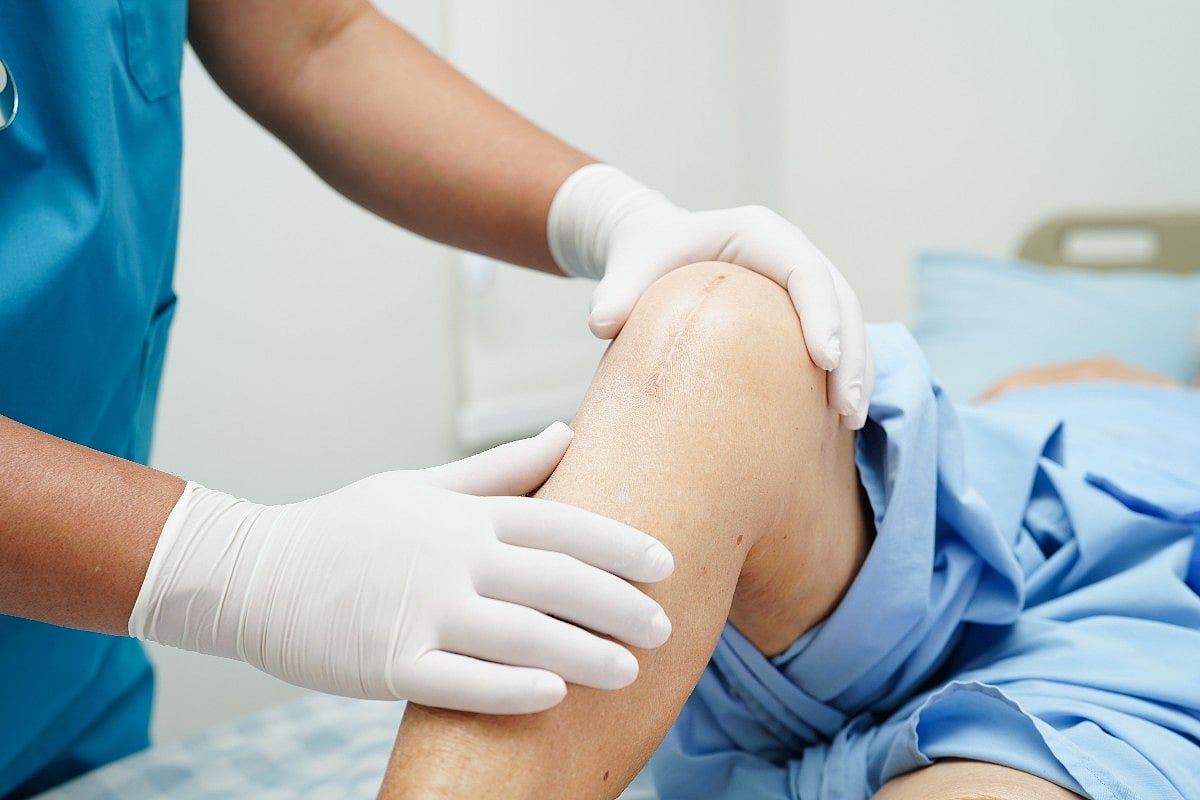Get Healthy!

- I. Edwards
- Posted April 6, 2025
Knee Replacement Recovery Time: What You Need To Know
Wondering what recovery is really like after knee replacement surgery?
Dr. Ayesha Abdeen, chief of hip and knee replacement surgery at Boston Medical Center, breaks down exactly what to expect -- from managing pain in the first few days to getting back on your feet and returning to the activities you love.
Total knee replacement (TKR) surgery is usually done using spinal anesthesia along with a nerve block to help reduce pain after surgery. Right after the procedure, you will likely still feel pain relief from the nerve blocks for about eight to 12 hours.
Once the spinal anesthesia wears off -- usually within the first hour or so in the recovery room -- you will be encouraged to start walking.
Early movement helps speed up recovery and lowers the risk of serious blood clots that can form in your leg (deep vein thrombosis) and travel to your lungs (pulmonary embolism).
You will also be given a medication to help prevent blood clots, such as aspirin or a stronger blood thinner (anticoagulant), depending on the type of clots you have.
Pain during the first few days after TKR can be strong, especially in the front and back of the knee.
Pain in the back of the knee may be due to bone spurs caused by arthritis that are removed during the surgery.
To help manage this, specific nerve blocks are used right before surgery. After surgery, a “multi-modal” approach to pain relief is used.
This means you’ll get a combination of medications like acetaminophen, anti-inflammatory drug and low-dose opioids.
These medications often begin before surgery and continue afterward. Opioids are usually stopped after one to two weeks to reduce the risk of dizziness, breathing problems, constipation, nausea and other issues.
How soon can you go home after surgery?
Patients arrive at the hospital the day of surgery and can often go home the same day or the day after. Physical therapy starts the same day as surgery and continues for six to 12 weeks.
When can you walk again after knee replacement surgery?
You can begin walking as soon as the anesthesia wears off. You’ll be allowed to put full weight on your leg, but most surgeons recommend using an assistive device such as crutches or a walker for the first few days or weeks to help with balance and prevent falls.
What exercises can help speed recovery?
Strengthening your quadriceps and hamstrings.
Stretching these muscles to improve flexibility at the knee in flexion (bending) and extension (straightening). This is key to avoiding scar tissue and stiffness.
Balance and proprioception exercises (which help your body sense where your joints are) to prevent falls.
Gait training to help improve the way you walk.
When can I return to my regular activities?
Depending on your activity level before surgery, you can resume walking right away.
If you have a desk job, you may return in two to four weeks. For more active jobs that involve standing or walking, it may take four to six weeks. Jobs involving heavy labor may take six to 12 weeks. You should not drive until you have stopped taking opioid medications and are cleared by your surgeon.
You can start returning to sports gradually, based on your physical therapy and the type of sport. In general, most people return to sports within six to 12 weeks. Low-impact activities like walking, cycling, swimming and golf are recommended.
It’s best to avoid high-impact activities like running or jumping to protect the new joint.
When should I see a doctor about pain after surgery?
Pain is expected during the first few days and usually gets better after a few weeks. Ice and pain medications can help manage this. If you develop increasing calf and/or thigh pain and swelling, you should contact your doctor as this could signal a blood clot.
If you notice fluid, pus or bleeding at the incision, call your surgical team.
How long does a knee replacement last?
A knee replacement usually lasts 15 to 20 years, but sometimes it can fail earlier.
Reasons for failure include joint infection (which can happen soon after surgery or years later from infection spreading through the bloodstream), wear and loosening of the components, bone fracture around the implant, instability or severe stiffness.
More information
Boston Medical Center has more on total knee replacements.
SOURCE: Dr. Ayesha Abdeen, Boston Medical Center





